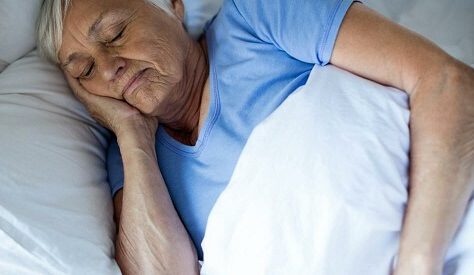This article will outline ways to improve sleep and manage sleep disorders for healthier aging, emphasizing the need for professional consultation and the benefits of exploring memory care facilities in Brookings if sleep issues significantly impact daily activities.
As you grow older, you might feel that you wake up earlier or stay without sleep throughout the night. According to specialists, sleep interruptions are caused by growing older in age. As a person’s age increases, it becomes more difficult to fall and stay asleep. Sleep apnea and insomnia are frequent sleep disorders among elderly people. Sleep apnea is a sleeping disorder that, if not treated properly can lead to major health issues such as high blood pressure and heart problems.
Poor sleep habits, such as inconsistent sleep-wake cycles and daytime deep sleep can increase insomnia and other sleep disorder. Consumption of caffeine, alcohol and some medicines can all interfere with sleep. Mostly sleep issues are seen in the elderly than in younger people.
These problems occur frequently, if not properly treated or diagnosed. Insomnia is typically identified as a disorder that makes difficulties in sleep despite having the opportunity to do so (e.g., being in bed) and experiencing difficulties in daytime activities as a result.
Usually, senior people become sleepy earlier in the evening and sleep less deeply than younger people. So it’s probably unrealistic to expect to sleep as long or as soundly as you did when you were younger as you get older. For those seeking support, memory care facilities in Brookings can provide assistance tailored to these needs.
How Naturally does Sleep Habits Changes as Someone Gets Older?
The way you sleep or your sleeping habit naturally changes as you grow older. The suprachiasmatic nucleus (SCN) is a bilateral structure situated in the anterior area of the hypothalamus in the human brain. It is the central pacemaker of the circadian timing system, regulating the majority of the body’s circadian rhythms. This has an impact on your daily routine, such as when you get hungry, tired, etc. This region of the brain begins to deteriorate as age increases, disrupting circadian rhythms and resulting in not proper sleep. Changes in hormones such as melatonin and cortisol, which your body produces less of as you age, also impair sleep.
If you can’t control your sleeping time or are a frequent mid-day sleeper. there’s no doubt that getting a good night’s sleep will be interrupted. Older adults are prone to have more sleep issues than younger people, but that doesn’t mean they need any less sleep.
Specialists say people over 65 should get 7-8 hours of sleep each night. If you’re someone with sleep issues, you probably think that sounds unrealistic, but there are many simple things you can do to get better sleep.
Can sleep apnea lead to Alzheimer’s Disease? This question has garnered attention, as untreated sleep apnea can potentially contribute to cognitive decline. Prioritizing good sleep hygiene is crucial for overall health and well-being.
How Much Amount of Sleep You Need?
The duration of time you will need to spend sleeping differs from person to person. Adults should obtain 7 to 9 hours of sleep every night, according to experts. As a result, an average of 7 hours of sleep is sufficient for everyone. However, as you get older, if you see a decline in your normal sleeping hours to less than 5 hours, you are in a dangerous scenario. Nutrition plays a crucial role in brain health and is vital for managing Alzheimer’s disease, as a well-balanced diet can help support cognitive function and overall well-being in affected individuals. To increase your sleep, you will need to follow certain suggestions.
Here are the 10 best ways to sleep better as you grow older:
1. Maintain a Bedtime Routine
First thing, you need to maintain daily a bedtime routine. A daily routine can assist your body in controlling its circadian cycles and resetting your mind and body.
Go to bed for sleep and wake up at the same time every day, try falling asleep in the same posture, or take a warm cup of tea. Whatever works for you, the goal is to have signals that signal your body it’s time to sleep. Those who maintain a bedtime routine can get proper sleep regularly.
2. Let your Mind and Body get Relaxed
Take some time to get your mind relaxed and thoughts out before turning out the lights. It is crucial to calm both your mind and body. Before going to bed, you should slow down your body for around half an hour to an hour. At least an hour before bed, turn off your cell phone, computer, and TV. The light from these screens can interfere with your body’s natural clock!
3. Do Whatever you Enjoy
Do whatever you enjoy! If you appreciate what you are doing, you will feel happy, which will keep you calm and free of anxiety. Many people suffer from sleeplessness as a result of their worry.
You may read a book, listen to music, or do anything you like. Yoga, meditation, and other types of relaxation are all options. Anything that helps you relax before going to bed for sleep is a great bedtime activity.
4. Take a Warm Bath
The drop in body temperature when you get out of the bathtub may help you feel sleepy. It can also help you relax and calm down, making you more ready to sleep.
5. Make the Bedroom a Sleeping Area
Get up if you’re still awake 20 minutes after going to bed. Return to bed only when you are so much sleepy and tired. Train yourself to conceive of the bed as a sleeping space alone.
6. Avoid Afternoon Sleep
If you sleep deeply during the day, you’re more likely to stay awake at night. So, you should try to avoid afternoon sleep as much as possible.
7. Don’t Drink Alcohol Before Going to Bed
Don’t drink alcohol before going to bed for sleep, as alcohol consumption can interrupt sleep. Therefore, try to avoid drinking alcohol before bedtime. It can make you wake up at midnight. So it is highly recommended not to drink alcohol before your bedtime.
8. Drink Fewer Fluids at Night
Taking so many fluids at night can interrupt your sleep a lot. Try to take fewer fluids at night, therefore you will get a sound sleep at night which is very crucial for your health.
9. Make a Perfect Sleep Environment
Keep your room as dark and silent as possible, and at the temperature that is most comfortable for you. Keep away non-sleeping activities, such as working or watching TV, out of the bedroom. It is critical that your bedroom be a location where you can relax properly.
10. Stay Active During the Day
Staying engaged in different activities during the day can make you tired at night and help you to get better sleep at night.
Exercise has also proven to help anyone sleep better. Exercise enhances part of your energy during the day, and helps a lot for a deeper sleep. Avoid exercising right before going to bed since it may have the reverse impact. Aerobic exercise activities such as walking and dancing are the best choice. Sleeping disorders are quite irritating, and it might be tempting to give up and attempt to live with them. It is critical to get rid of sleeping disorders and stay active during the day.
A good night’s sleep might be waiting for you on the other side of the pillow. We provide a range of activities at Azalea Gardens senior living communities to assist our residents to get rid of sleeping disorders and get for a good night’s sleep.
Sleep Better as You Grow Older – Memory Care Facilities in Brookings!
At Azalea Gardens senior living communities, we understand the unique sleep challenges that come with aging. Our caring staff is dedicated to creating a comfortable and supportive environment that promotes restful sleep. With personalized care plans and engaging activities, we help residents establish healthy routines that enhance their overall well-being.
Discover how we can support you or your loved ones in achieving better sleep and a more fulfilling life. Reach out to Azalea Gardens today!





